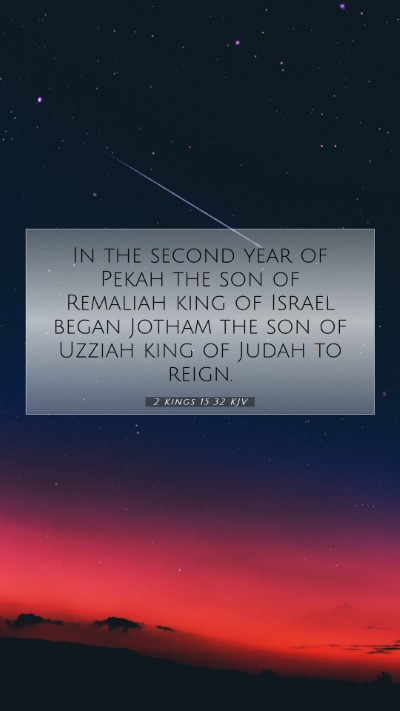Understanding 2 Kings 15:32
Verse: “In the second year of Pekah the son of Remaliah, king of Israel, began Jotham the son of Uzziah king of Judah to reign.”
This verse serves as an instrumental transition in the narrative of the kings of Judah and Israel. It marks the beginning of Jotham's reign and provides a historical context vital for understanding the timeline of Israel's and Judah’s kings. By examining 2 Kings 15:32, we delve into numerous themes, including divine sovereignty, the importance of righteous leadership, and the political tumult of the era.
Bible Verse Meanings
Jotham ascends to the throne during a tumultuous period, following his father Uzziah’s leprosy and death. His reign may have started in a time of uncertainty and transition, reflecting the challenges that confronted the nation both politically and spiritually.
Historical Context
- Jotham's reign occurs in the context of the divided kingdom of Israel and Judah, with Israel being led by Pekah (2 Kings 15:27-31).
- The historical backdrop includes conflicts between these two kingdoms, as well as oppression from neighboring powers like Assyria.
- Understanding the reign of Jotham requires a grasp of the preceding events, particularly his father’s reign and the crises faced by the nation.
Bible Verse Interpretations
Public domain commentaries offer diverse insights on the implications of Jotham’s reign:
- Matthew Henry: Emphasizes Jotham’s relatively upright character in comparison to his contemporaries, noting that he walked in the ways of his father, Uzziah. He undertook improvements in Judah that reflected a commitment to God’s commandments.
- Albert Barnes: Focuses on the political ramifications, noting that Jotham's reign was marred by the ongoing threat from Israel and the Assyrian Empire. His dignified dealings sought to stabilize Judah amidst constant turmoil.
- Adam Clarke: Discusses the significance of timing in Jotham's reign, linking it with the prophetic calls to righteousness that preceded and followed his time, thus highlighting the spiritual undertones during his kingship.
Significance of Jotham’s Reign
Jotham's leadership is significant for various reasons:
- He continued reforms and built up the defenses of Jerusalem, strengthening the kingdom against external threats.
- His reign is a foreshadowing of Ahaz’s reign, providing a contrast between righteous and wicked leadership that helps readers understand the cycle of faithfulness and disobedience.
- Jotham's character provides an example of what it means to govern with integrity in challenging times, serving as a reminder for leaders throughout history.
In-Depth Bible Verse Analysis
In analyzing this verse, we explore not only the historical implications but also personal applications for readers today.
Applying Bible Verses to Daily Life
Readers can draw lessons from Jotham's commitment to doing what is right. It highlights the importance of ethical leadership and the need for moral integrity in all positions of authority.
Cross References
Several related scriptures enrich the understanding of 2 Kings 15:32:
- 2 Chronicles 27:1-7: A parallel account of Jotham's reign, detailing his accomplishments and character.
- Isaiah 7:1-6: Context of the historical issues faced during Jotham’s reign, including the looming threat from Israel and Syria.
- Amos 1:1: Provides insight into the prophetic context during Jotham's and subsequent kings’ reigns.
Bible Study Insights
This verse is essential for any Bible study groups focusing on the kings of Israel and Judah. Through structured Bible study guides addressing leadership and moral integrity, participants can engage meaningfully with this scriptural passage.
For those interested in in-depth Bible verse analysis, 2 Kings 15:32 offers a rich context for understanding the broader narrative of Israel’s history and the consequences of leadership decisions.


